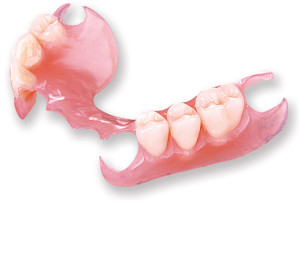dentures
Types of dentures:
Partial denture: When a few teeth are missing the space is filled by a partial denture. The denture is held in place by clasps on the natural teeth nearby.
Full denture: This is made when all the natural teeth are missing. Full upper and or lower dentures can be made.
Immediate denture: This is a partial/full denture made to be inserted on the same day as a tooth/ teeth are extracted. This avoids a period without teeth and helps speed up the healing of the socket(s) after the extraction.
Overdenture: This is a denture that fits over the top of one of the following: remaining natural teeth, implants which anchor the denture or tooth roots that have had root canal treatment.
Denture materials:
Acrylic: traditional pink plastic material. For partial dentures metal stainless steel clasps are used to secure the denture to the remaining teeth. This is bulky, the least comfortable and also the cheapest option.
Duraflex: This is the newest partial denture material. It is very flexible, strong and the most comfortable of the tooth coloured options. There are no metal clasps as the denture is held in by clear ‘wings’ with frictional grip on the neighbouring teeth. They work very well when made on one side of the mouth (unilateral) thus can be much less bulky. They are more expensive than traditional acrylic above but far superior in all respects.
Cobalt chrome: This is a thin very strong metal framework to which the teeth are attached. The framework lasts indefinately and it is much less bulky and more comfortable than traditional acrylic but about double the cost. This option is only possible after any sockets have finished healing and cant be used for immediate dentures like the other two materials above.
Benefits of dentures:
Dentures help to maintain normal speech and chewing function, restore support to your lips and chin (so they dont fall in) as well as improving the appearance of your smile. They are the most cost effective and often practical option for replacing missing teeth. Immediate dentures act like a bandaid over a healing socket and help to reduce initial swelling and improve healing.
Disadvatages of dentures:
Being a foreign body there are more surfaces for plaque to adhere to; thus home cleaning must be very dilligent to avoid the denture bringing down gum health and increasing the risk of decay. Being removable they are generally less comfortable than fixed options like implants.
Cleaning and maintenence of your dentures:
-Clean your denture at least twice a day, especially after meals
-Use a specially designed brush and unperfumed mild soap or approved denture cleaner
-Put water in the sink while brushing so they dont break if dropped
-Avoid using hard brushes and toothpaste as they are too abrasive and will damage the denture
-Avoid very hot/boiling water as dentures can warp
-Avoid detergents, bleaches, methylated spirits and other strong chemicals
INSTRUCTIONS FOR IMMEDIATE DENTURES:
The process and aftercare:
- Impressions are taken and the denture made first. On the day of the extraction(s) the denture is inserted and checked after the tooth/teeth have been removed while you are in the surgery.
- Follow all the usual postoperative instructions given to you regarding extractions. They are also listed in full under the heading ‘for patients’ on this website.
- The immediate denture needs to be left in place undisturbed for the first 24 hours, thus for the first night it is necessary to sleep with them in. This acts to compress the socket(s) and prevent swelling, speeding up the healing.
- If any bleeding continues during the first 24h, bite using firm pressure on a gauze pack for 30-60min with the denture in. Feel free to call me at any time if you are concerned.
- After the first 24 hours I will see you to remove the denture, rinse the socket and review things. If this is not possible for any reason, it is necessary for you to start the salt water mouth rinsing after the first 24 hours: carefully remove the denture and rinse the socket with warm salty water (1 teaspoon of salt in a cup of lukewarm water). Rinse the denture with water. This flushes out food etc from the socket and helps to relieve pain and prevent infection.
- Continue rinsing with warm salty water as much as you can for the first week; the more the better. You can rinse 5-6 times a day if you can, with the most important time being after meals.
- After the first 24 hours you can keep the denture in during the day, taking it out to rinse the socket and clean it after eating and before sleeping.
- After this first night it is essential to remove the denture during the nights from then on as it becomes an irritant to the socket; only the first night is spent sleeping with it in.
- Start by eating soft foods only and avoid sharp, hard or sticky foods.
- It is very important to attend the review appointment after 1-2 weeks; it is usual to need a small adjustment during the healing period as things change.
The socket takes around 3 months to heal completely. After this time the definitive replacement of the tooth/teeth can be made. During healing the tissues shrink and the fit of the immediate denture may become loose. It then often needs either relining to fill this space or remaking. The initial immediate denture can be kept as an emergency spare if a new denture is made.
Possible complications of dentures:
-It is essential to remove dentures at night to give the mouth a rest and the tissues some oxygen. If this isnt done a fungal infection called Candida albicans can develop in the underlying gums and tissues.
-Dentures may have to be relined over time to fill in the space created when the tissues shrink underneath. Full dentures need to be remade every 4-8years on average.
-Loose or poorly fitting dentures can knock around causing painful chronic inflammation of the gum tissue. It is essential to review the fit at periodic exams, even if there are no natural teeth present. Over time dentures need adjusting. If there is a sore area leave the denture out to prevent an ulcer developing. Several hours before your dental appointment put it back in; this allows the area that needs adjustment to become more obvious.
-If you have a dry mouth (eg caused by many medications), getting good retention of your denture can be much more difficult. It is worth using a saliva replacement gel or spray to help. These are available in the surgery and from chemists.
-It takes a period of time, usually weeks- months, to adapt to new dentures. It can be helpful in the initial paeriod to speak more slowly, eat softer foods and avoid sticky, sharp and hard foods.
-Adjustments are usually necessary in the early stages of adapting to a new denture. It is essential not to try and adjust them at home. It is possible to break off the clasps and damage the denture in other ways. It must be handled by a dentist or dental technician.

